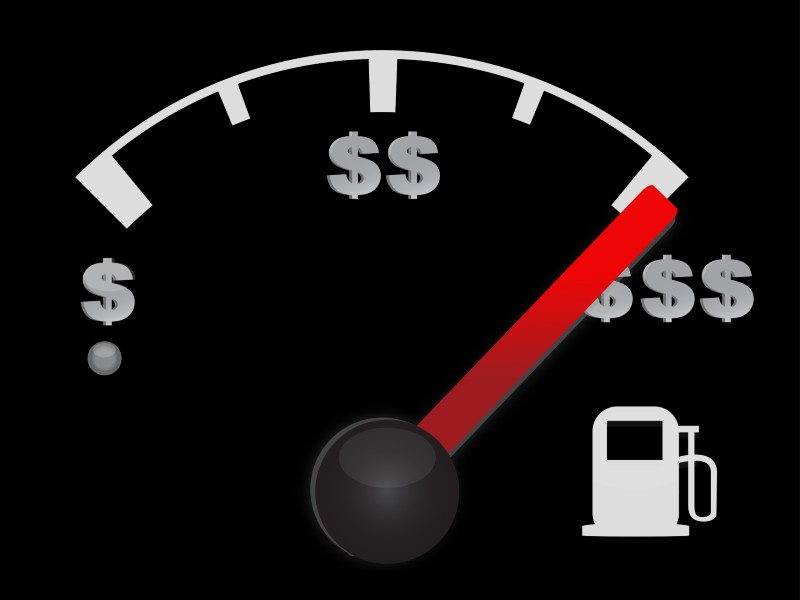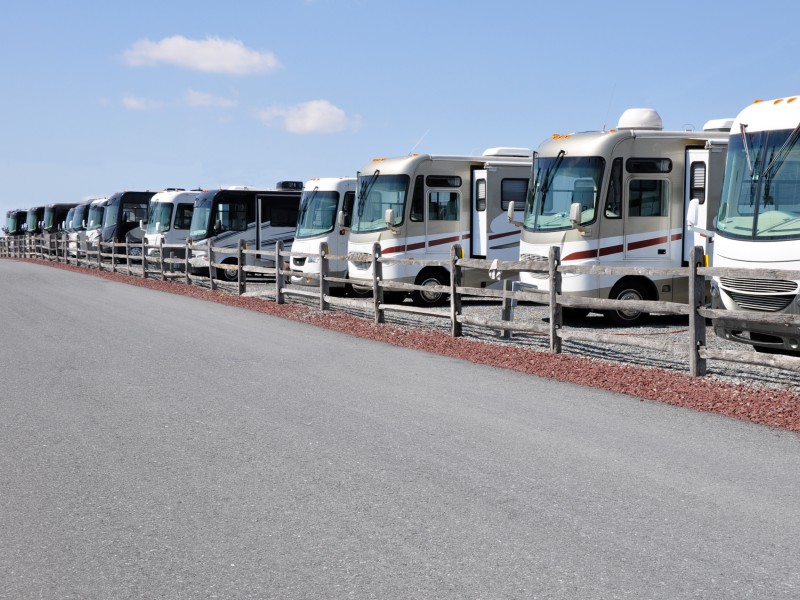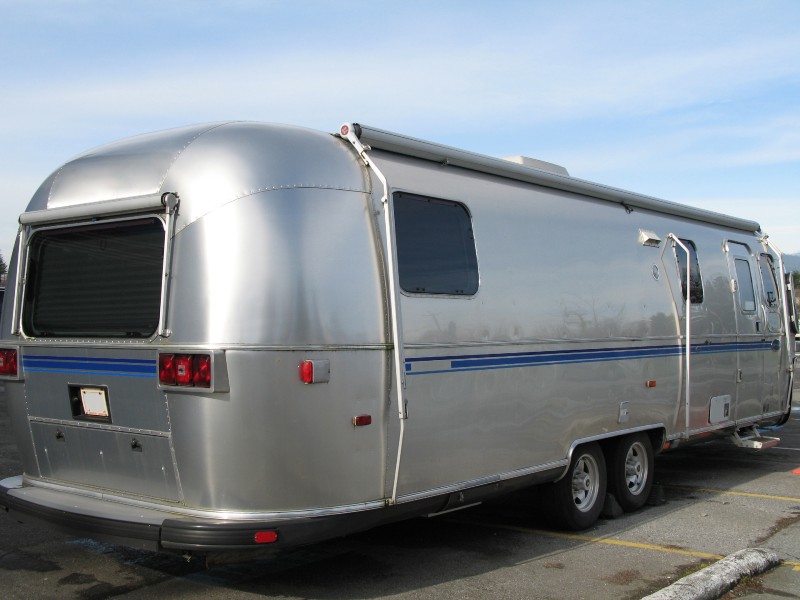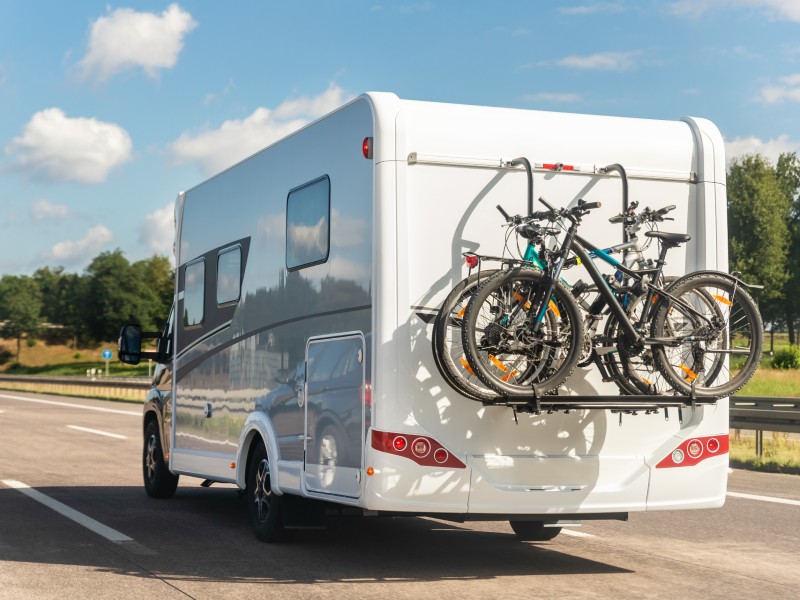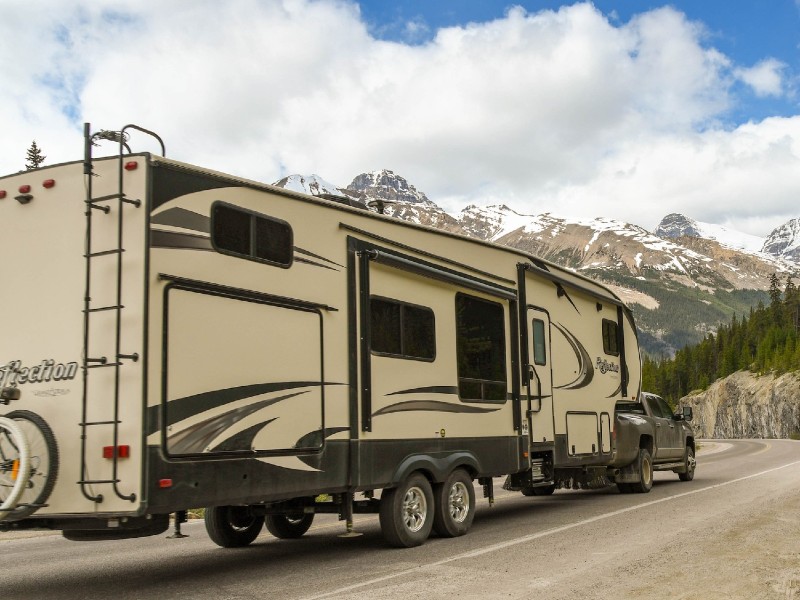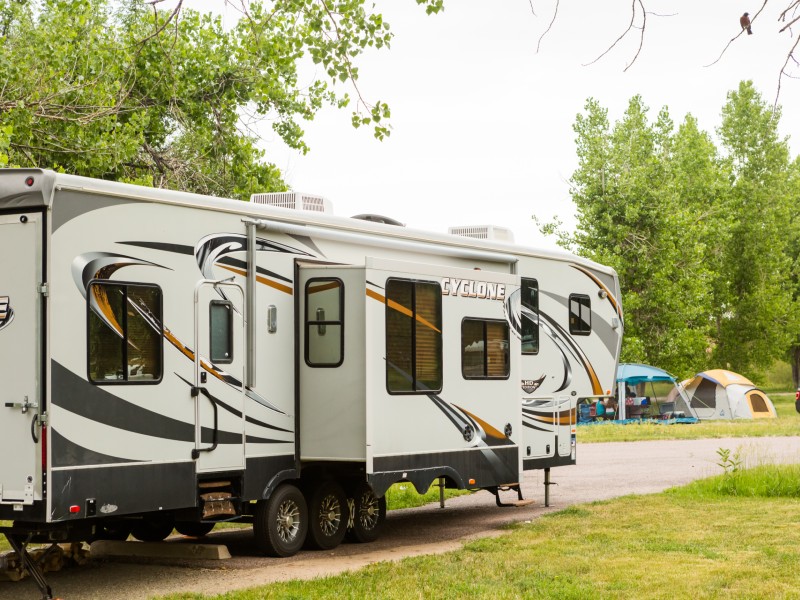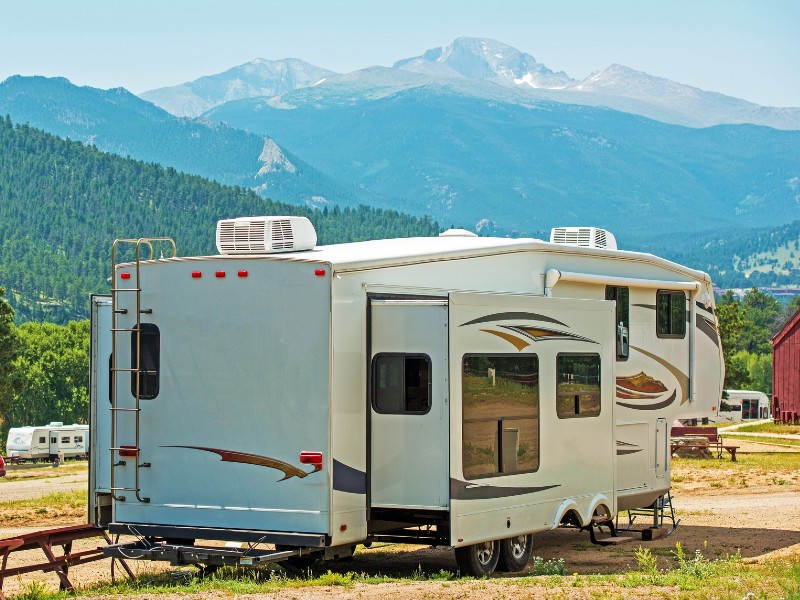RVs are the most popular form of vacation vehicle on the market today. They can be seen on super highways, two-lane main roads, back-country roads, and along the seashore.
Anyplace or every place is appropriate. The type of RV you choose will help determine the gas mileage, the amenities, the towing capacity, and the type of experience you wish to have.
A basic gasoline-powered RV with an automatic transmission and cruise control generally has a fuel capacity of about 55 gallons with approximately seven to twelve miles to the gallon. Of course, road conditions and your driving style will factor into it.
Try to stay away from any type of gridlock. You use more fuel when you are idling or inching along in a stop-and-go fashion.
Choosing the season and the location may help prevent that kind of congestion, but, of course, you have no control over accidents, road closures and detours.
The difference in size and weight among Class A, Class B, and Class C is worth mentioning.
Both the size of the tank and the weight of the motorhome will factor into fuel consumption. Gas tanks can range in size from 25 gallons to 200 gallons.
A lot of people wonder what is the size of an average fifth-wheel camper because gas mileage plays a big role in size and weight!
In all cases, type of fuel, gear ratios, vehicle weight, size of the engine, driving habits, topography, wind resistance, and other factors affect fuel consumption
The Class A motor coach is the most lavish and can cost several million dollars.
Their large tanks may be able to hold more than 150 gallons of fuel, depending on the brand, size, and the year it was manufactured.
The Class B coach is smaller; its tank holds about 25 gallons of fuel. A smaller tank means filling up more often, but it also means it will cost less to fill up.
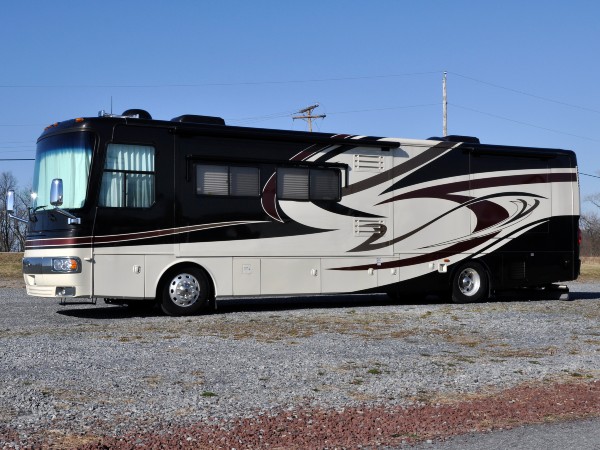
The Class C motorhomes are generally less expensive than the Class B, and they are smaller. This translates into greater fuel capacity, ranging from 40-80 gallons.
Regardless of the type of motorhome you purchase, the terrain and weather conditions in which you will drive figure considerably in fuel consumption.
Will you be driving in hilly or mountainous areas? Is the surface of the road smooth or rough? Will it create wind drag?
Improved aerodynamics, using wind deflectors, may help with that.
While manufacturers say that you can get 10-20 miles to the gallon, the actual number of miles you get to the gallon in an RV depends on several factors:
- Weight of the vehicle
- Rate of speed
- Type of fuel
- Maintenance of the vehicle
All of these considerations will affect the type of gas mileage you get. Let us consider them individually.
WEIGHT OF THE VEHICLE
The weight of the RV is affected by how much you load in it, the amount of gas in the tank, and whether or not you are towing another vehicle, such as a car, boat, or trailer filled with recreational toys.
If you are going across the country, and you want to get the best mileage possible, leave all periphery items at home. Save those for short weekend trips. You will enjoy camping a lot more if you do not have to fill up the tank every 100 miles.
If a car gets 24-40 miles per gallon, consider its size vs the size of an RV. An RV that gets 20 miles to the gallon is likely all hype.
Do not purchase one with that expectation. The larger the vehicle, the more gas you will use, and the less mileage you will get to the gallon.
A 100-gallon tank on Class A may allow you to travel around 1000 miles, whereas you could only travel around 400 miles in Class B with a 25-gallon capacity.
When it comes to warranty questions, people always wonder about gas mileage as one of the most important things.
The Class C may give you around 450 miles of travel with a 25-gallon tank capacity. These averages are all contingent upon other factors, which may improve or decrease the mileage.
The inside of the coach also carries much of the overall weight of the unit. The generator, appliances, water tanks, and slide rooms are evenly distributed, so check the owner’s manual to determine the weight each axle can carry.
The empty RV weighed on a certified scale at a truck stop, will give you the base weight so you will know how much you can pack in it. Heavy items should be distributed evenly on the floor throughout the length of the coach.
Re-weigh, and make any necessary adjustments. Use this information to pack lightly where the heaviest weight is apparent and pack heavy in places with the lightest weight.
For efficient distribution, place the heavy items down low and the lighter items up high.
RATE OF SPEED
If you like to speed, you should probably stick to a mini-van or an SUV for vacation travel.
A large rig speeding down the highway is more dangerous because its weight prevents it from stopping at the same distance as a lighter-weight vehicle. In addition, the faster you drive, the more gas you use.
That is true whether you are in a small coupe or a large motorhome. To reduce fuel usage, drive at an economical speed – not too fast and not too slow.
Even though most motorhomes adhere to the same speed limits as passenger cars, it would be wise to slow down to a comfortable speed and enjoy the scenery.
You cannot really appreciate a gorgeous pastoral scene if you are whizzing by at 70 miles per hour. If you tow a vehicle, go at a much slower speed to make certain that you are within the law.
Keep in mind that the heat and the structure of the tires begin to weaken at increased speeds, and the weight capacity slowly decreases as speed increases. The advantages of driving at a comfortable speed are numerous.
Check road conditions and weather reports prior to starting your trip. Leave at least one trailer and one vehicle length between your coach and the vehicle ahead of you for every 10 miles per hour of speed.
Explore the Great Outdoors with Us!
TYPE OF FUEL
Fuel economy is the goal of any vehicle. If you purchase an RV that uses diesel fuel, you will pay more upfront believing you will get more miles to the gallon.
First, diesel fuel is often more expensive than gasoline. It generally depends on the region in which you purchase it. You will probably find that the savings are in its towing capacity, allowing you to tow more weight.
You may find diesel a little less expensive at truck stops across the country, but be aware that you may pay an additional tax above the posted price. The cheaper price is apparently only for commercial vehicles.
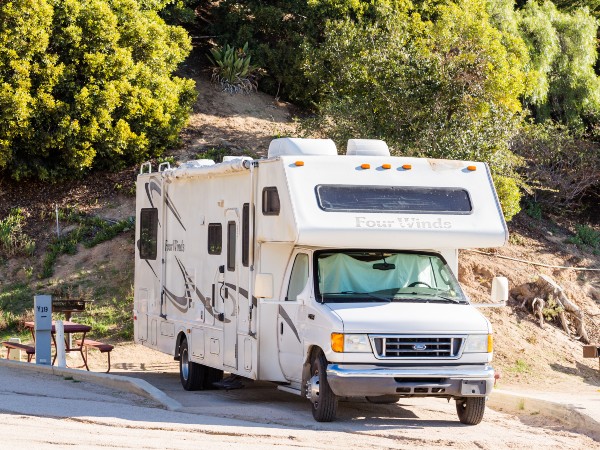
It is a toss-up at regular pumps. It may or may not be less expensive.
The cost to service a Class A diesel engine is usually much more than a gasoline engine; it requires much more oil, and most of them have multiple filters.
The larger diesel motorhome is much heavier and will likely get only about five or six miles to a gallon of fuel. It is very expensive to repair a diesel engine because you will need a particular dealer brand for the drive train.
The tires alone cost much more because of their size.
In addition to the higher cost to service and maintain, you may find fewer campgrounds that can accommodate a rig of that size.
All-in-all, having a Class A motorhome with a diesel engine is expensive.
On a positive note, they have an expected lifetime of 1,000,000 miles and can generally go half -a- million miles before any major repairs are needed.
MAINTENANCE
Keeping the motorhome well-maintained will increase fuel efficiency, and you will see a difference at the pump. A coach that is regularly serviced will lower the overall expenses of your RV.
A regular tune-up and adequate tire pressure will help you obtain maximum mileage on a tank of gas. Gas consumption increases when the tire pressure is too high or too low. Always have the motorhome serviced before you take it on the road.
Sometimes, when you are deciding the most efficient way to have adventurous camping vacations, you choose an RV based on how nice it looks inside and the number of wonderful features it has.
While all of those details are wonderful, the most important factor that you should consider is how much it will cost to operate.
Often, people buy the motorhome of their dreams and, because of the expense involved in operating and maintaining it, it is parked more often than it is used.
Be consumer smart. Look at the best options for your budget. If your goal is a certain level of comfort, are you willing to forego it for better gas mileage?
You may be able to find a way to offset the amount you spend on gas if you prepare in advance and take advantage of anything that will sustain your budget and allow you to enjoy your RV at the same time.
If you are on the road for an extended period of time, and it is your home away from home, do not neglect the maintenance.
It will still need to be tuned up after the allotted number of miles, and the tires will still need to be checked to assure proper pressure.
You may be able to stretch those fuel dollars by downsizing to a more economical unit or by using RV apps that show the least expensive prices.
Estimate the cost of your RV vacation by planning in advance. Forecasting expenses before you start on the trip can save you money.
Research every place you plan to visit, the route you plan to take, campground fees, when you plan to go, the time of year you plan, and the number of miles from one location to another.
Camping guides and route planners can be a tremendous help. The one published by the Good Sam Club is invaluable. Whenever people ask about how many miles to the gallon RVs get, route planners are not far behind the question.
It provides exact information on who to contact at each park so that you can ask specific questions about fees, sites, or other information that may be pertinent. This will help to avoid any nasty surprises when you arrive.
Camping fees can vary considerably depending on the location. Check the ones that will save you money and help you stay within your budget, which you set before you leave home.
With fuel being a major variable, plan ways to manipulate other fluctuating expenditures to keep you within budget.
For example, if you can pay less per night than the budgeted amount, you may stay longer at the site, or perhaps you can negotiate a lower rate in exchange for a longer stay.
The kind of vacation you want will ultimately determine the cost. If you want to hang out at the campground because there are so many great activities, you will not spend money at expensive tourist attractions or pay high prices at expensive restaurants.
Of course, if that is included in the plan, then, of course, it is included in the budget. Be candid about what the expectations are, and no one will be disappointed.
Find out how many miles per gallon your motorhome gets and the general diesel or gasoline prices. Knowing before you go can save you a tremendous amount of money because you can manipulate times, fees, and other variables to make it more amenable to your situation.
Owners of rigs similar to yours can be a wealth of information for learning about mileage and fuel consumption. Check with the highway patrol or with AAA to learn the average price of gasoline across the country. Internet sites can also provide helpful information.
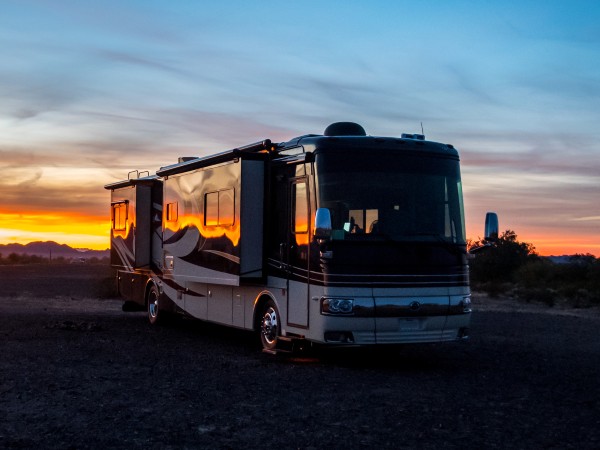
After you have done your homework, it is easier to determine general expenditures by using simple math. You want to be sure that your budget can survive the vacation.
Divide the trip distance by the number of miles you get per gallon and multiply that by the average cost of a gallon of gas. This will give you a fairly accurate amount that fuel will cost.
Fuel will be the most expensive item on an RV trip, but you must take into account campground fees, food, entrance fees into places of interest, and any special plans for specific projects or schedules on your itinerary.
As close as you can project, anticipate any and all expenditures that you are likely to encounter.
The United States is crammed with many free goodies that will make a camping vacation enjoyable.
Balance the freebies with the interests that are costly, and you should still be able to have a fantastic trip while staying within that all-important target amount you have set for your budget,
Pack the basics you will need for the type of trip you are taking. You do not need every item in your home.
Let some articles do double duty, where appropriate. If you are going to be gone longer than a weekend, you will especially need to pack with care so as not to feel claustrophobic.
Of course, extended stays will require an extra sense of the “chop-chop” to keep the weight low, as well as to give you space to stretch out. That becomes even more essential when you live in your coach over a longer period of time.
So, to put the cost of fuel in perspective, the number of miles you get to a gallon of gas has as many variables as the trip itself will have.
The most important thing to keep in mind is that you purchased an RV to use for your enjoyment. Keeping it in storage or in your driveway will not provide you with the joyous times you had in mind when you purchased it.
The cost to fill up the tank is going to be minor compared to the wonders you are going to experience as you travel the nation’s highways.
Also taking care of it helps the engine get more gas efficiency. Remember, the less work an RV engine has to do, the more miles to the gallon the RV will get!
- How does the type of RV (Class A, B, or C) affect its fuel efficiency?
The type of RV significantly affects its fuel efficiency due to differences in size, weight, and aerodynamics.
Class A RVs, being the largest and heaviest, typically have the lowest fuel efficiency, while Class B RVs, which are the smallest, offer the best fuel efficiency, and Class C RVs fall somewhere in between.
- How does the weight of the RV and its load impact its miles per gallon?
The weight of an RV and its load can significantly impact its miles per gallon (MPG) because heavier vehicles require more energy to move, which means they consume more fuel.
Specifically, for every additional 100 pounds an RV carries, its MPG can decrease by up to 2%, depending on the vehicle’s weight, aerodynamics, and engine efficiency.
- What driving habits can improve the fuel efficiency of an RV?
Adopting a smooth and steady driving style, avoiding rapid acceleration and braking, can significantly improve the fuel efficiency of an RV.
Additionally, maintaining optimal tire pressure, reducing excess weight, and using cruise control on highways can also contribute to better fuel economy.
- How does the type of fuel (gasoline vs. diesel) impact the fuel efficiency and overall operating costs of an RV?
The type of fuel significantly impacts the fuel efficiency and overall operating costs of an RV.
Diesel engines typically offer better fuel efficiency and longer engine life, but they are more expensive to purchase and maintain, while gasoline engines are cheaper upfront but consume more fuel and may require more frequent maintenance.
- What maintenance practices can help improve an RV’s fuel efficiency?
Adopting a smooth and steady driving style, avoiding rapid acceleration and braking, can significantly improve the fuel efficiency of an RV.
Additionally, maintaining optimal tire pressure, reducing excess weight, and using cruise control on highways can also contribute to better fuel economy.
"Of all the paths you take in life, make sure a few of them are dirt."
-- John Muir
